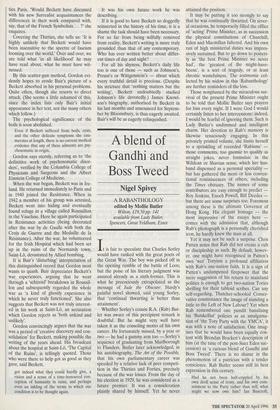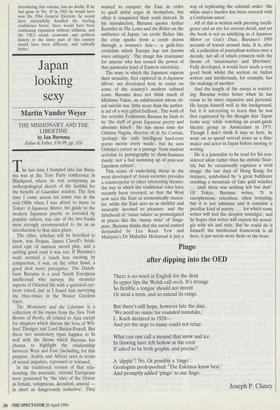A blend of Gandhi and Boss Tweed
Nigel Spivey
A RABANTHOLOGY edited by Mollie Butler Wilton, £19.50 pp. 141 available from Lady Butler, Spencers, Great Yeldham, Essex It is fair to speculate that Charles Sorley would have ranked with the great poets of the Great War. The boy was picked off in the opening rumble of the battle of Loos; but the poise of his literary judgment was assured already as a sixth-former. This is what he precociously extrapolated as the message of Jude the Obscure: Hardy's painful novel showed, said young Sorley, that 'continual thwarting is better than attainment'.
Whether Sorley's cousin R.A. (Rab) But- ler was aware of this percipient remark is doubtful. But he might very well have taken it as the consoling motto of his own career. He fortunately missed, by a year or two — he had a gammy arm too — Sorley's sequence of graduating from Marlborough to Flanders. Butler later acknowledged, in his autobiography, The Art of the Possible, that his own parliamentary career was speeded by a relative lack of peer competi- tion in the Thirties and Forties, precisely because of the war losses. From the day of his election in 1929, he was considered as a future premier. It was a consideration plainly shared by himself. Yet he never attained the position.
It may be putting it too strongly to say that he was continually thwarted. On sever- al occasions, he temporarily filled the office of 'acting' Prime Minister, as in succession the physical constitutions of Churchill, Eden and Macmillan faltered. And his own run of high ministerial duties was impres- sively sustained. But to go down to posteri- ty as 'the best Prime Minister we never had', the 'greatest of the might-have- beens', is a sort of tragedy, or at least chronic wastefulness. The testimonia col- lected by his widow in this `Rabanthology' are further reminders of the loss.
Those nonplussed by the miraculous sur- vival of the present Prime Minister ought to be told that Mollie Butler says prayers for him every night. If I were God I would certainly listen to her intercessions: indeed, I would be fearful of ignoring them. Such is Lady Butler's undimmed and intelligent charm. Her devotion to Rab's memory is likewise tenaciously engaging. In this privately printed volume, she limits herself to a sprinkling of recorded `Rabisms' those comments, too gnomic to qualify as straight jokes, never formulaic in the Wildean or Shavian sense, which her hus- band dispensed as a personal speciality but has gathered the more or less conven- tional reminiscences of others, including the Times obituary. The names of some contributors are easy enough to predict Roy Jenkins, Enoch Powell, Bill Deedes but there are some surprises too. Foremost among these is the ultimate Governor of Hong Kong. His elegant homage — the most impressive of the essays here comes with the admission that, although Rab's photograph is a personally cherished icon, he hardly knew the man at all.
Yet it may not be such a surprise. Chris Patten notes that Rab did not create a cult or discipleship as such. By default, howev- er, one might have recognised in Patten's own 'wet' Toryism a profound affiliation with Rab's one-nation faith. It is a sign of Patten's undampened firepower that the mere suggestion of his return to mainland politics is enough to get two-nation Tories shrilling for their tabloid scribes. Can any self-regarding, Thatcher-schooled Conser- vative countenance the image of standing a little to the Left of New Labour? Yet when Rab remembered one pundit banalising his `Butskellist' policies as an amalgama- tion of 'the Tory Party with the YMCA', it was with a note of satisfaction. One imag- ines that he would have been equally con- tent with Brendan Bracken's description of him (at the time of the post-Suez Eden suc- cession) as 'a curious blend of Gandhi and Boss Tweed'. There is no shame in the phenomenon of a patrician with a tender conscience. Rab Butler seems still its best expression in this century.
Had he not been half-crippled by his own droll sense of irony, and his own com- mitment to the Party rather than self, what might we now owe him? Ian Bancroft, introducing this volume, has no doubt. If he had gone to No. 10 in 1963 he would have won the 1964 General Election: he would have successfully handled the sterling confidence factor, there would have been continuing expansion without inflation, and the UK's social, economic and political history in the latter part of this century would have been different, and radically better.



































































 Previous page
Previous page